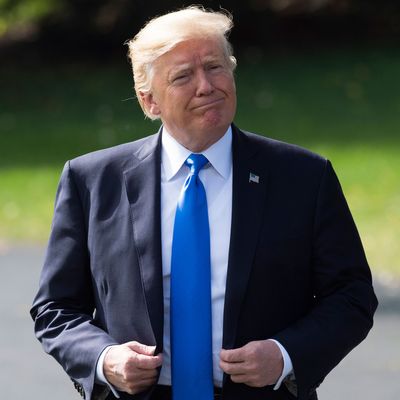
The Trump campaign knew that the Russian government intended to steal Hillary Clinton’s emails before virtually anyone else did. Of the many bombshells that Robert Mueller detonated Monday, this might be the most incendiary.
According to a newly unsealed affidavit, in late April 2016 George Papadopoulos met an unnamed professor in London, who told the Trump campaign adviser that he had “just returned from a trip to Moscow where he had met with high-level Russian government officials” — and learned that “the Russians had emails of Clinton … thousands of emails.”
Papadopoulos may have been a low-level staffer on a freelance mission. But he kept his superiors well-informed of his findings — and they offered him enthusiastic approval.
Weeks after Papadopoulos’s rendez-vous in London, Donald Trump Jr., Paul Manafort, and Jared Kushner took a meeting with Russian lobbyists on the understanding that the Kremlin wished to provide the Trump campaign with “documents and information that would incriminate Hillary” — as “part of Russia and its government’s support for Mr. Trump.”
This was days before the Washington Post revealed that Kremlin-aligned hackers had penetrated the Democratic National Committee — and one month before the FBI began its investigation of Russian interference in the 2016 election.
There have been no small number of damning revelations in the Trump–Russia scandal. But the most incriminating might be this: In 2016, Trump’s campaign manager (Manafort), campaign co-chair (Sam Clovis), foreign policy adviser (Papadopoulos), son-in-law (Kushner), and large adult son (Don Jr.) all at least entertained the idea that the Russian government was working to hurt Clinton’s candidacy — and yet the president publicly and incessantly mocked that very notion, even after every American intelligence agency had affirmed its veracity.
One week after his son took a meeting to collect dirt from the Kremlin — and two months after a member of his campaign staff was told that Russia had Clinton’s emails — Trump told his supporters, “We believe it was the DNC that did the hacking as a way to distract from the many issues facing their deeply flawed candidate and failed party leader.”
By campaign’s end, Trump had argued that the hack might have been perpetrated by “China,” or “somebody sitting on their bed that weighs 400 pounds” — or that there never was any hack at all.
In December 2016, the CIA concluded that Russia had interfered in the U.S. election with the intention of aiding Trump’s candidacy. The president-elect responded by disparaging the agency as “the same people that said Saddam Hussein had weapons of mass destruction.”
Trump went on to argue that determining responsibility for a computer hack might be beyond the ability of America’s intelligence agencies — and, then, that those agencies might be trying to fabricate a case for Russian interference.
After meeting with intelligence officials, Trump’s team still refused to say explicitly whether the president accepted their assessment of Russia’s role in the 2016 election, writing in a statement, “While Russia, China, other countries, outside groups and people are consistently trying to break through the cyber infrastructure of our governmental institutions, businesses and organizations including the Democrat National Committee, there was absolutely no effect on the outcome of the election including the fact that there was no tampering whatsoever with voting machines.”
As of July 2017, Trump still refused to acknowledge Russian involvement in the DNC hack, saying during a trip to Poland, “I think it could very well have been Russia, but I think it well could have been other countries, and I won’t be specific.”
Days later, after meeting with Putin face-to-face, Trump evinced so much faith in Russia’s good intentions, he suggested that he might work with the Russian leader on “forming an impenetrable Cyber Security unit so that election hacking, [and] many other negative things, will be guarded and safe.”
Given what we now know, what is the innocent explanation for this behavior?
At least five members of the Trump campaign thought that the Russian government was interfering in the 2016 election on the mogul’s behalf at some point last year. That’s not counting Michael Flynn, who is under investigation for allegedly participating in an effort to secure stolen Clinton emails from Russian hackers.
Are we supposed to believe that none of them ever mentioned any of this to Trump — that, when the president was castigating the CIA for the absurd suggestion that Russia wanted him to be elected, his son and son-in-law never raised a peep?
The only plausible, “innocent” explanation for Trump’s incessant denials is this: The idea of having his electoral triumph tarnished by Russian meddling was painful to his ego; so, even though he had independent verification of the CIA’s core claim, he chose to ridicule the agency to protect his public image and self-esteem.
Trump’s repeated claims that he actually won the popular vote — if you subtract the millions of “illegal” Clinton votes — lends some credence to the idea that his postelection mendacity could be driven by narcissistic injury, rather than anxious guilt at having personally colluded with the Russian government.
But this explanation isn’t exactly “innocent.” It still leaves us with a president who was willing to disparage intelligence findings, which he had every reason to believe were true, out of sheer egotism. And anyhow, this account still doesn’t explain the vehemence of Trump’s preelection denials.
The Republican propaganda machine is playing its bad hand with admirable creativity. It has found arguments for why Manafort’s misdeeds have nothing to do with Trump; Papadopoulos’s confession is a nothingburger; Don Jr.’s meeting with the Russians was fair play; and even that the Mueller investigation is actually a scandal for (President) Hillary Clinton. But no one — not Sean Hannity, Steve Bannon, or The Wall Street Journal’s editorial board — has been able to tell us why the Donald doth protest so much.
And that silence speaks volumes.






























